Just a couple of months after Porsche CEO Michael Macht declared they didn’t want hybrid technology in their sportscars comes this superb looking 918 Spyder concept model. Announced at the Geneva Motor Show, the 918 Spyder features a race-inspired 500hp V8 and is supplemented by 230hp of electric power.
The 918Â joins the GT3 R Hybrid announced last month. Add in the Cayenne S Hybrid and you now have three Porsche model lines featuring hybrid technology.
Back to the 918 Spyder, though, and, well it is clearly the most stunning of the trio. All that power is said to propel the car to 100km/h in around 3.2 seconds. Proving further that hybrid doesn’t mean slow and steady wins the race, the 918 can (supposedly) lap the Nürburgring Nordschleife in under 7 minutes 30 seconds. Faster than a Carrera GT, no less.
When you’re not exploiting all that power, Porsche reckon you can return a fuel consumption figure of 3l/100km with CO2 emissions of just 70g/km.
Pretty tidy numbers all round for a mid-engined two-seater with a very tasty 3.4-litre V8 from the RS Spyder racecar.
Check the pics and press release after the jump.
UPDATE 3 March: Two new “next spark” promo videos featuring the Porsche 918 Spyder have been added below.
UPDATE 29 July: Porsche have confirmed the 918 will go into limited series production.
Highly Efficient and Ultra-Fast: Concept Car with Plug-In Hybrid
Porsche Presents 918 Spyder High-Performance Concept Sports Car in Geneva
Stuttgart. Presenting a high-performance mid-engined concept sports car with ultra-efficient, low-emission drive technology, Dr. Ing. h.c. F. Porsche AG, Stuttgart, is further increasing the Company’s competence in hybrid technology.
The 918 Spyder prototype combines high-tech racing features and electro-mobility to offer a fascinating range of qualities: An emission level of just 70 grams CO2 per kilometre on fuel consumption of three litres/100 kilometres (equal to 94 mpg imp) truly outstanding even for an ultra-compact city car, on the one hand, combined with the performance of a super sports car and acceleration from a standstill to 100 km/h in just under 3.2 seconds, top speed of 320 km/h (198 mph) plus, and a lap time on the Nordschleife of Nürburgring in less than 7:30 minutes, faster than even the Porsche Carrera GT, on the other.
The 918 Spyder is one of three Porsche models with hybrid drive making their world debut at the 2010 Geneva Motor Show. This trio – made up of Porsche’s new Cayenne S Hybrid SUV with parallel full-hybrid drive, the 911 GT3 R Hybrid racing car with electric drive on the front axle and a flywheel mass battery, and the two-seater high-performance 918 Spyder mid-engined sports car with plug-in hybrid – clearly demonstrates not only the great bandwidth of this new drive technology, but also the innovative power of Porsche as a genuine pioneer in hybrid drive.
The highly innovative 918 Spyder concept car combines Porsche’s Intelligent Performance technology, high-tech in motorsport, and classic but modern design to make a truly convincing statement.
The Porsche 918 Spyder with plug-in hybrid provides the performance of a thoroughbred super sports car on fuel consumption of just three litres/100 kilometres in the New European Driving Cycle, equal to a CO2 emission rating of 70 g/km.
This open two-seater is powered by a high-speed V8 developing more than 500 bhp and running at maximum speed engine of 9,200 rpm as well as electric motors on the front and rear axle with overall mechanical output of 218 bhp (160 kW).
The V8 combustion engine is a further development of the highly successful 3.4-litre power unit already featured in the RS Spyder racing car and positioned midship in front of the rear axle, giving the car the right set-up for supreme performance on the race track through its good balance.
Power is transmitted to the wheels by a seven-speed Porsche-Doppelkupplungs-getriebe also feeding the power of the electric drive system to the rear axle. The front-wheel electric drive powers the wheels through a firm transmission ratio.
The energy reservoir is a fluid-cooled lithium-ion battery positioned behind the passenger cell. The big advantage of a plug-in hybrid is that the battery can be charged on the regular electrical network. A further point is that the car’s kinetic energy is converted into electrical energy fed into the battery when applying the brakes, thus providing additional energy for fast and dynamic acceleration.
A button on the steering wheel allows the driver to choose among four different running modes: The E-Drive mode is for running the car under electric power alone, with a range of up to 25 km or 16 miles. In the Hybrid mode the 918 Spyder uses both the electric motors and the combustion engine as a function of driving conditions and requirements, offering a range from particularly fuel-efficient all the way to extra-powerful.
The Sport Hybrid mode uses both drive systems, but with the focus on performance. Most of the drive power goes to the rear wheels, with Torque Vectoring serving to additionally improve the car’s driving dynamics.
In the Race Hybrid mode the drive systems are focused on pure performance with the highest standard of driving dynamics on the track, running at the limit to their power and dynamic output. With the battery sufficiently charged, a push-to-pass button feeds in additional electrical power (E-Boost), for example when overtaking or for even better performance.
With the hybrid drive system offering this wide range of individual modes and applications, the 918 Spyder is able either to achieve lap times comparable to those of a thoroughbred racing car – such as less than 7:30 minutes on the Nordschleife of Nürburgring – or, focusing on a more economical style of motoring, with a reduction in emissions to just 70 grams of CO2 per kilometre.
Like the drivetrain, the lightweight body structure of the 918 Spyder also bears out the car’s DNA carried over directly from motorsport: The modular structure with its monocoque bodyshell made of carbon-fibre-reinforced plastic (CFP) and the appropriate use of magnesium and aluminium not only reduce weight to less than 1,490 kg or 3,285 lb, but also ensure supreme driving precision thanks to the very high level of torsional stiffness.
Reminiscent of highly successful, legendary racing cars such as the Porsche 917 Le Mans and the current Porsche RS Spyder, the 918 Spyder with its design concept so typical of Porsche arouses powerful emotions. The combination of racing car dimensions, clearly structured design with perfectly balanced surfaces, and innovative details all round creates an overall pattern of aesthetic, perfectly balanced harmony in design full of power and dynamics. This indeed is the ideal synthesis of form and function following Porsche’s design DNA.
The smooth balance of tradition and progress gives the car a powerful stance on the road in its combination of dimensions. Variable aerodynamics typical of Porsche ensure both visionary and traditional highlights especially around the rear spoiler. The striking rear hoods extending out of the headrests, in turn, not only fulfil an aerodynamic function on the 918 Spyder, but also accommodate retractable air intakes with a ram air function.
The driver and passenger are not only perfectly embedded in contoured sports bucket seats, but also form part of the cockpit with its synthesis of efficient function and ergonomic high-tech operation offering an outlook at the interior architecture we may possibly see in super sports cars of the future. The three free-standing circular dials for road speed (left), engine speed (middle) and energy management (right) would appear to come directly from a racing car in the ‘60s, bearing out that unique philosophy of driver orientation so characteristic of Porsche.
The centre console rising up towards the front in the 918 Spyder houses a touch-sensitive surface for intuitive control of the car’s functions, serving consistently to reduce the number of visible controls and maintain the principle of direct operation.
The control units relevant to the driver are concentrated in particular on the three-spoke multifunction sports steering wheel, while the variable driving modes, again so typical of Porsche, are supplemented by a map switch enabling the driver to call up various drive programs and serving as the push-to-pass button for E-boosting, for example when overtaking. Instrument illumination, finally, varies from green for the consumption-oriented running modes to red for the performance-oriented driving programs.
The 918 Spyder also comes with further innovative functions such as the Range Manager. After being activated in the Center Display, the Range Manager uses the map in the navigation system to present the remaining range the car is able to cover, naturally allowing the driver to influence that range through the appropriate choice of power and performance. In cities with environmental alert areas the Range Manager also states whether the driver is able to reach a certain destination on electric power alone.
Applying this information and using further info on the availability and location of special energy filling stations, the driver is then able to choose his personal style of driving as well as the right battery charge and filling strategy.
Offering a unique combination of extremely low fuel consumption, supreme performance and long electric range, the Porsche 918 Spyder represents an essential milestone in Porsche’s strategy on the way to genuine electro-mobility.
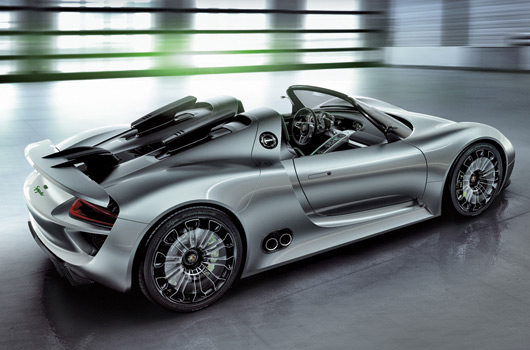
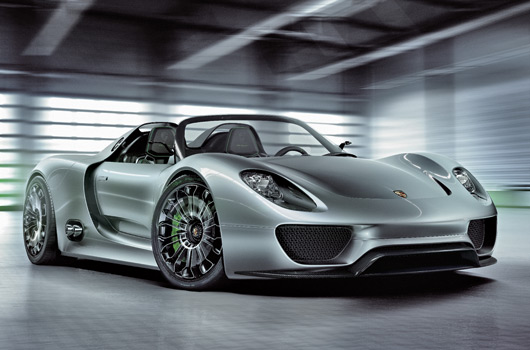
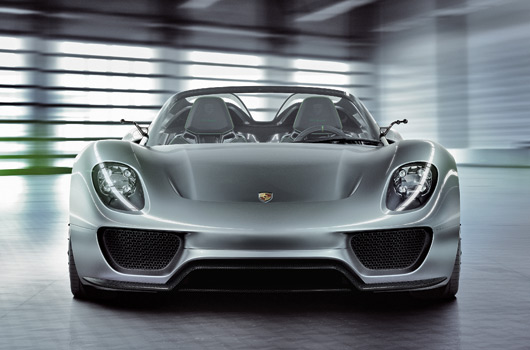
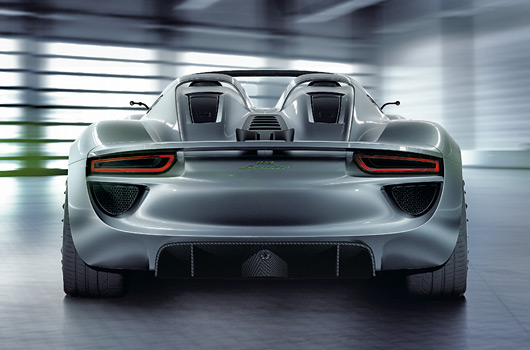
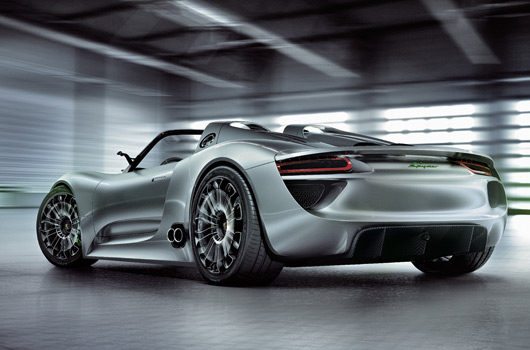
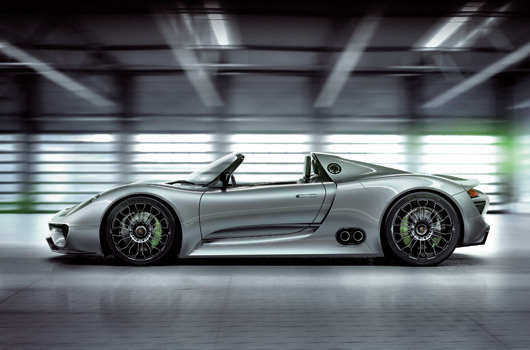
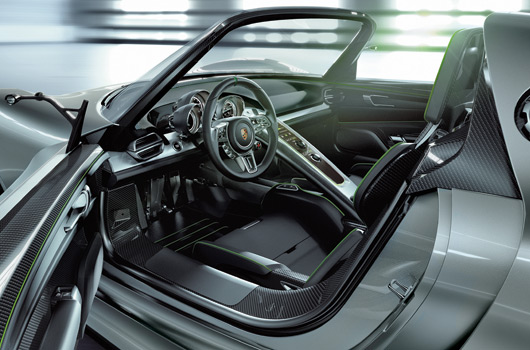
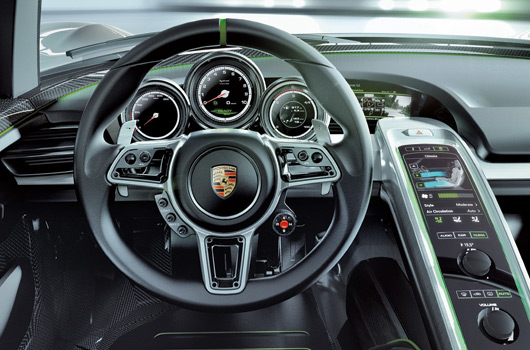
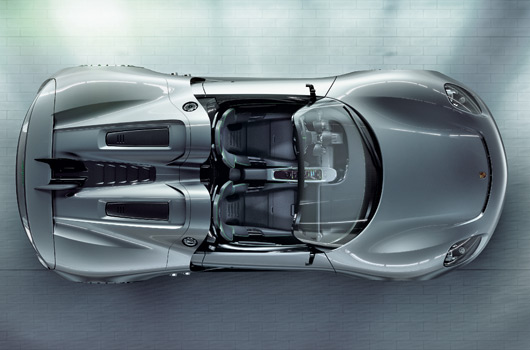
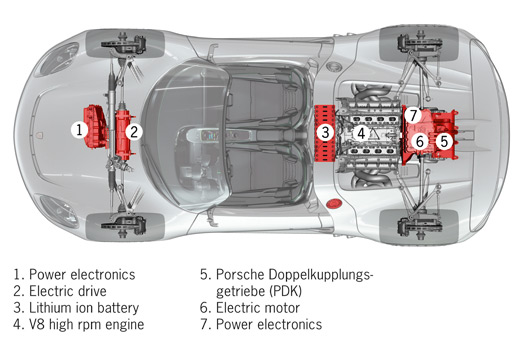
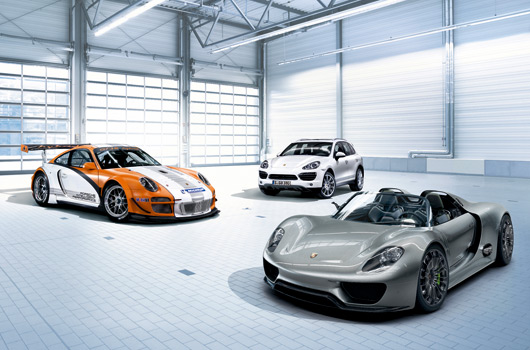
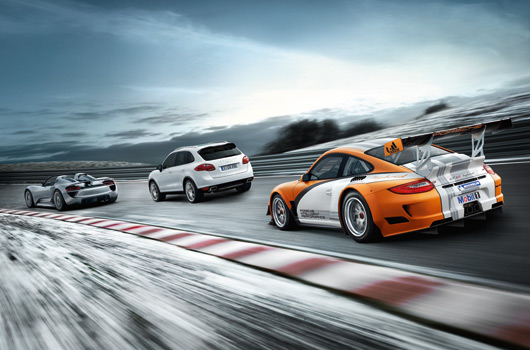
28 replies on “Geneva: Porsche 918 Spyder with hybrid drive”
Wow! That is all. Those polycarbonate (?) wheels are impressive, too.
[…] today’s earlier news about the 918 Spyder plug-in hybrid comes this 12 minute promo on Porsche’s hybrid technologies. Shown below, in […]
So why can’t they make their Cayenne that fuel efficient too? I will be truly impressed when they create a 3/100km Cayenne. Heck, or even a 911. As nice as this 918 is (and I truly love it!), it will be out of reach for al but 0.001% of car enthusiast.
Lima, post this video too. Very nicely done.
http://www.youtube.com/watch?v=h5tn2Kerwyc
“With an electric motor range of up to 25kms”
Did I hear that right!? Why bother?
Is that to meet legislation requirements?
Interesting styling though.
[…] sets for Christmas and have been waiting for the first opportunity to show what they can do. Porsche, Ferrari and Audi are just some of the kids to have flicked the switch at Geneva. Volkswagen, too, […]
[…] wonderful looking Porsche 918 Spyder which debuted at the Geneva Motor Show in March is one step closer to reality according to a report […]
[…] stunning Porsche 918 Spyder with hybrid drive could be racing in next year’s Nürburgring 24 hour race according to […]
[…] stunning Porsche 918 Spyder with hybrid drive could be racing in next year’s Nürburgring 24 hour race according to […]
[…] Porsche 918 Spyder now has around 2000 expressions of interest. Last we heard the count was at 900 or so, just 100 […]
[…] have confirmed recent rumours by approving full series production of the 918 Spyder hybrid […]
[…] Porsche first launched the 918 Spyder in March they reckoned it could lap the Nürburgring Nordschleife in 7 minutes 30 seconds. That’s […]
[…] late July word came through that Porsche had signed off on production for the stunning 918 Spyder with hybrid drive. Now a prototype 918 is touring the United States. It is understood the car will […]
[…] publication Road & Track brings us a first sound bite of the Porsche 918 Spyder. Actually, looking at the screen cap above, you get a great sense of the car’s size and, of […]
[…] the recent appearance of footage showing the Porsche 918 Spyder in action it seems Porsche design boss Michael Mauer was feeling left out. But, as you can see from […]
[…] is fast becoming Porsche 918 Spyder central; this is the fourth article on the hybrid hypercar inside one week after all. However, this […]
What a great looking car. I think they (Porsche) realise to keep on with the 911 is a bit daft when with a clean sheet design they can move the engine forward into a more balanced Mid-Engine position.
I can see this being the car to beat when it hits the road. As far as I’m concerned, but I am biased being an ex Porsche owner. I used to own the last of the 928s the GTS 5.4 litres of V8 german power. What a great car it was, it could cross countries at 150-165mph and felt as stable as a train, but when needed I raced a 911 through country lanes at 5am on a summers morning and he edged ahead on the corners but I caught up on the straights.
[…] speculation tends to suggest it will be a 918 Coupé; a model sitting above the 911, but below the 918 Spyder, which debuted at Geneva last […]
[…] certain the world debut Porsche has planned for the Detroit Auto Show is a racing version of the 918 Spyder, which was first shown in hybrid form at Geneva last […]
[…] Porsche 918 RSR has just been revealed at the Detroit Auto Show. Its body based on the 918 Spyder, its power inspired by the 911 GT3 R […]
[…] offered in one configuration—the Spyder version. It’s almost a year since we first saw the 918 Spyder at Geneva, but since then Porsche has shown off the tin-top 918 RSR. The latter model, shown at Detroit […]
[…] production version of the 918 will be heavily based on the concept car shown at Geneva last year. Indeed, aside from the addition of a removable one-piece roof, any changes appear to be minimal, […]
[…] Wired have been invited along to Nardo in Italy to take a closer look at the development of the 918 Spyder. You’ll recall the concept was first launched at the 2010 Geneva Motor Show. It promises […]
[…] overall look has moved on a little from the 2010 concept car, but the beautifully proportioned supercar shape has not been […]
[…] little over a week since we saw a Porsche 918 Spyder in monochrome Martini livery, Porsche has gone the full monty by revealing four pics of the 918 in […]
[…] addition to the gorgeous pictures of the Martini Racing inspired Porsche 918 Spyder prototype Stuttgart has released provisional specs for the […]
[…] of the Porsche 918 Spyder. The petrol electric hybrid sportscar has had a long gestation, first gracing the floor of the Geneva Motor Show in early 2010. It then trasnformed into the 918 RSR for the Detroit Auto Show in 2011, with the […]
[…] | Read Sources […]